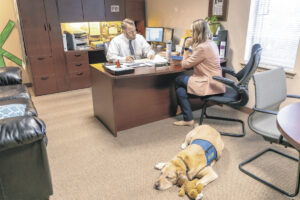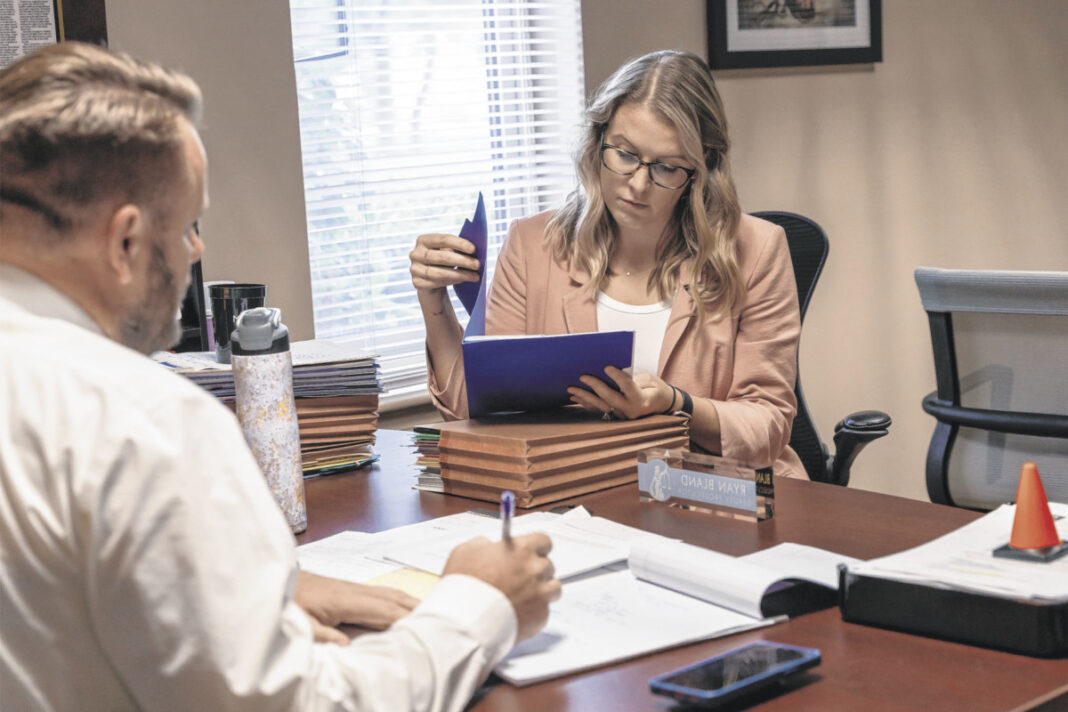More than a year-and-half into the coronavirus pandemic, county courts are still playing catch-up after a nearly three-month-long suspension of jury trials earlier this year.
Before the pandemic began in March 2020, the county was looking to have a typical year for jury trials. On average, the county has about 10 trials a year. By that March, the county had already had five.
Then the pandemic hit.
The Indiana Supreme Court issued an order suspending jury trials from March to August 2020, then again from Dec. 14, 2020 to March 1, 2021, citing the need for drastic measures as COVID-19 spread rapidly throughout the state.
The second order was issued a little more than a week after the state reported its highest COVID-19 positive case count on record — 5,627 cases on Dec. 6. The decision followed previous orders that allowed local courts to decide for themselves if they should temporarily suspend or reschedule jury trials for both civil and criminal cases.
Johnson County suspended jury trials soon after the pandemic began, following the procedures established by the Indiana Supreme Court, said Brandi Foster Kirkendall, a local courts administrator.
So far this year, the county has had 10 jury trials, which is average. But due to the suspension for parts of last year and this year, officials expect a higher than normal docket. Though they’re strained, those who work in the local courts system are forging ahead. Jury trials have always required extra work and care due to the nature of trials and a responsibility to ensure the constitutional rights of defendants are upheld, Kirkendall said.
“We’re trying to do the 10 we normally have, plus triage the backlog of the ones that still need to be tried,” she said.
The trials that have taken place so far this year were cases that would likely have been heard last year, as the trial dates were originally set in 2018 and 2019, if it wasn’t for COVID-19, Kirkendall said.
While trials were suspended, new cases continued to be filed, meaning that courts now have nearly double the caseloads they had in 2019.
“We’re already a year behind typically, and now it’s about two years behind,” she said.
The challenges facing jury trials are more than just the suspension. The pandemic led to several changes to how a jury is selected, and how the jury deliberates, Kirkendall said.
The trials are taking longer due to safety protocols related to COVID-19. Normally, the county might start a jury trial on a Tuesday morning, have 75 jurors come in at the same time and go through the selection process, then start the trial. Now, court officials don’t want to have 75 people in a crammed courtroom for everyone’s safety, so they bring potential jurors in in waves of about 20, which takes more time.
As a result, court calendars are booked up, which means that during the times a court would normally be able to hear other cases, they cannot, Kirkendall said.
“We’re having to push pretrial (hearings) and other cases. It affects the whole week, not just that jury trial that’s ahead,” she said.
Despite the increased time for jury selection and other safety measures due to the pandemic, courts have not seen many issues with the process. After the pandemic began, court officials created a COVID-19 addendum to the jury questionnaire that asks potential jurors about their concerns relating to COVID-19, such as if they’re immunocompromised.
Only a handful of people have refused to participate citing in trials due to COVID-19 concerns, and those who do refuse do not face any consequences, Kirkendall said.
“We thought we would hear a lot more concerns than we have,” she said.
Some courts implemented additional safety measures, some that vary by the particular courtroom. One court put together a goodie bag with masks, pens and notepads for each juror.
Johnson County Superior Court 2, supervised by Judge Peter Nugent, went another route during its first jury trial since the pandemic began. Instead of having the jury deliberate in a private room, Nugent gave them the entire courtroom so they could have space to spread out, Kirkendall said.
“(Nugent) put paper on the windows … and gave them the courtroom, which meant we had to lock all the computers, take away all the phones that were in the courtroom, and make sure all the recording was locked up so that they weren’t being recorded,” she said. “Just to make sure that if, on appeal, we had done everything to secure that room as much as possible.”
The true extent of the strain on the local courts system will likely not be seen until next year, or the year after, Kirkendall said.

At the Johnson County Prosecutor’s Office, though, the true extent of the strain is already being felt.
The pandemic paused trials, but cases continued to be filed and still need to be resolved. Late last month, a two-year-old case was resolved when a Franklin man was found guilty of child molesting after a two-day jury trial, Prosecutor Joe Villanueva said.
The prosecutor’s office is doing its best to maximize the availability of courts for trials in light of limited trial dates resulting from the backlog and ongoing safety precautions, Villanueva said.
“It takes a thousand things for a trial to go, but only a few things to make it not go,” he said.
Villanueva’s office has tried to speed up the process due to the backlog. Now, prosecutors are looking at which cases are most likely to continue make it to trial, and assigning those first. If that trial ends up getting postponed, they would have a second trial ready to go in its place so that the open time slot is not wasted, he said.
“We’re going to try to get cases through the system faster,” Villanueva said.
That means deputy prosecutors are preparing for two or more trials at a time with a limited staff. Those who may not have been on a case when it started may be asked to pitch in and help with something relating to the trial, he said.
“We are a team and we will work together to make things work,” Villanueva said.
And he agrees, the strain the pandemic put on the system will likely be felt for years to come, he said.





